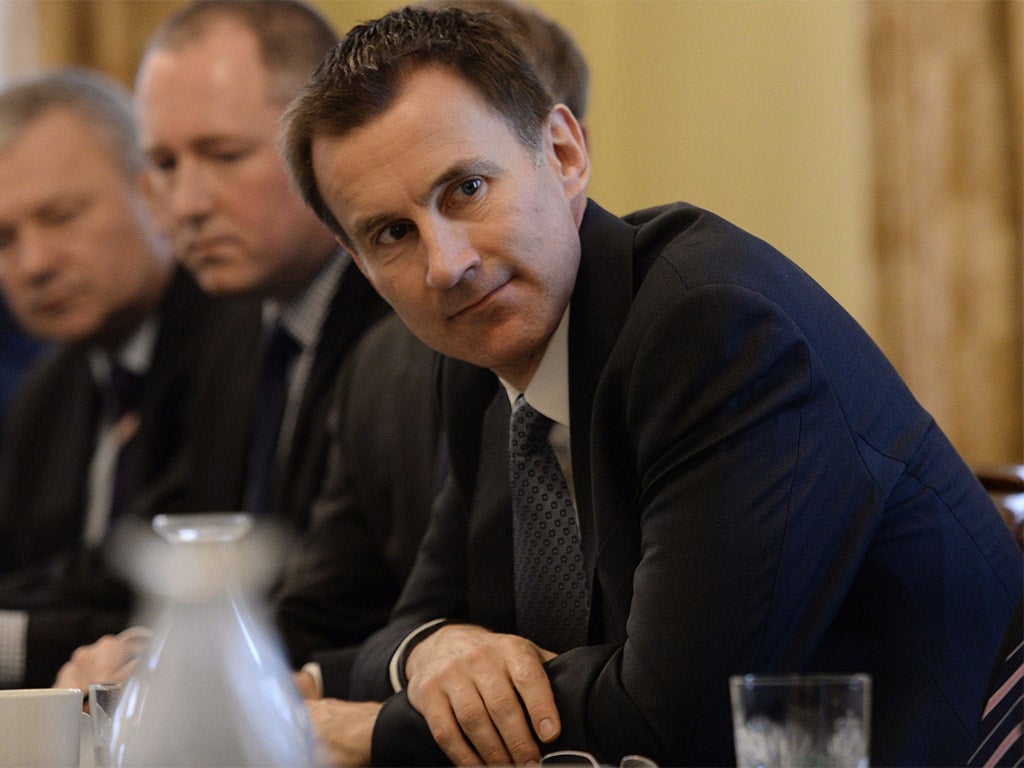Junior doctors: Jeremy Hunt risks 'untold damage' to future generations by imposing new contract, warns BMA
Union's chief negotiator launches fresh attack on ministers, accusing Health Secretary of 'crass' approach to NHS workforce

Your support helps us to tell the story
From reproductive rights to climate change to Big Tech, The Independent is on the ground when the story is developing. Whether it's investigating the financials of Elon Musk's pro-Trump PAC or producing our latest documentary, 'The A Word', which shines a light on the American women fighting for reproductive rights, we know how important it is to parse out the facts from the messaging.
At such a critical moment in US history, we need reporters on the ground. Your donation allows us to keep sending journalists to speak to both sides of the story.
The Independent is trusted by Americans across the entire political spectrum. And unlike many other quality news outlets, we choose not to lock Americans out of our reporting and analysis with paywalls. We believe quality journalism should be available to everyone, paid for by those who can afford it.
Your support makes all the difference.Jeremy Hunt, the Government and NHS managers are “out of touch” with the reality of working on the frontline of England’s hospitals and have risked “untold damage” to future generations by imposing the junior doctor contract, the British Medical Association has claimed.
As BMA leaders meet on Saturday to plan the next stage of their challenge to the contract, which could include further strike action, Dr Johann Malawana, the union’s chief negotiator, launched a fresh attack on ministers, accusing the Health Secretary of an “incomprehensibly crass” approach to the medical workforce.
Writing for independent.co.uk, Dr Malawana said Mr Hunt’s attempt to link junior doctors’ working hours with evidence of increased weekend mortality in hospitals had been “the final straw” for the profession.
But even before the current dispute, medics’ morale was already low, he writes, with understaffing on wards “simply ignored” by managers focused on “political imperatives”.
The latest salvo in the long-running dispute comes as official figures from the regulator NHS Improvement show hospitals and other services have overspent by £2.3bn in the nine months to December 2015, and are on track for a total year-end deficit of £2.8bn.
Officials said they were hopeful this figure could be brought down to something closer to the Government’s £1.8bn deficit target but it now appears increasingly likely that the Department of Health will breach its expenditure limit this year – an unprecedented situation.
Deepening deficits in hospital budgets demonstrate that that the health service is costing more to run than the funding the Government has allocated for it. Cash over-spent this year will come out of next year’s budget, eating into the £3.8bn funding increase the Government has pledged for 2016/17.
Although the BMA agreed to enter into negotiations on the junior doctor contract on the basis that new offer would be “cost neutral”, Dr Malawana said that the dispute had highlighted the true cost of running a safe NHS and the extent to which the current workforce has been “overstretched”.
“For many years junior doctors have been highlighting the issue of gaps in rotas,” he writes. “This concept of ‘missing doctors’ has been ignored by a management structure in the NHS that frankly cares very little about the welfare of the staff, focusing instead on the delivery of political imperatives”
He adds: “When morale was already very low, when management seemed be so out of touch with frontline issues, when the lack of any pastoral care of staff had become the norm in most doctors’ working lives, to call into question their professionalism was incomprehensibly crass.”
The Government’s course of action had risked “fatally” undermining the NHS, he writes, risking “untold damage for generations to come”.
The BMA has held seven meetings with junior doctor groups around the country in the past week, and union leaders will meet on Saturday to discuss their response to Mr Hunt’s decision to end negotiations and impose the contract. The Government says that 90 per cent of the terms in the revised contract had been agreed upon by the BMA.
However, BMA sources said that junior doctors attending meetings this week have told the union that they think they contract is “unworkable” for many, in particular part-time doctors and those working in specialties that require the most unsocial hours, such as A&E and maternity. The new contract reduces out-of-hours pay for juniors, in exchange for a basic salary increase of 13.5 per cent.
Responding to the NHS Improvement deficit figures, a Department of Health spokesperson said that increased health spending over the course of the Parliament and a clampdown on spending on agency staff would improve hospital finances.
“But hospital leaders must continue to show grip and swiftly introduce the reforms announced in the review into NHS efficiency published earlier this month, so every penny possible can be invested in frontline patient care,” the spokesperson said.
Join our commenting forum
Join thought-provoking conversations, follow other Independent readers and see their replies
Comments